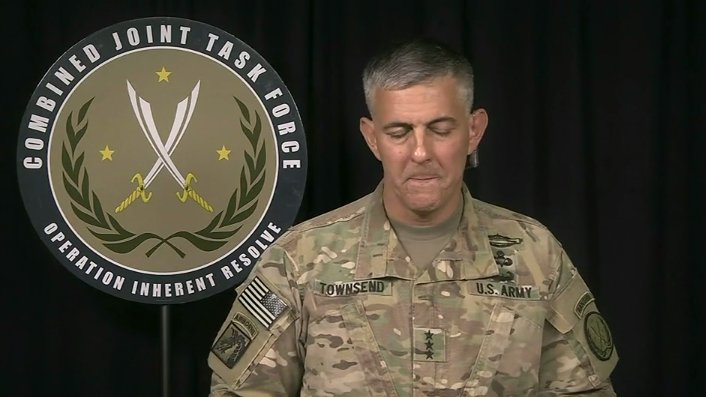Ghazwan Hassan, Ahmed Rasheed, Ros Russell and Helen Popper (REUTERS) quote eye witness Raied Khalid stating, "I was on my night shift and suddenly heard shooting and blasts. A few minutes later I saw one attacker wearing a military uniform and throwing grenades through the windows."
And the US Defense Dept announced, "In Iraq, coalition military forces conducted three strikes consisting of three engagements against ISIS targets near Qaim, destroying two ISIS fuel storage sites, an ISIS-held building, a front-end loader, a weapons storage area and an excavator."
Yes, the war goes on.
And they struggle to explain why.
Remember how the US is 'training' -- again?
Asked about this on Thursday, Lt Gen Stephen Townsend had a response.
GEN. TOWNSEND: Okay. So your question's about -- you know, the Iraqi Security Forces and what's different now than about them in 2014. I think you have to go back to 2011, when the coalition and the Iraqis parted ways.
I think what I can gather from looking at the period from 2011 to 2014 or 2013 is that the Iraqi Security Forces largely stopped training -- I'm not really sure what the mechanism of that -- the reason behind that was, but they did very little training after 2011.
And there was a significant change-out -- turbulence -- personnel turbulence, particularly in their leadership ranks. And I think the previous Iraqi government was more interested in putting leaders into a position who were of like mind than, maybe, leaders who would, by merit, protect the nation.
So then, we saw, you know, ISIS arrive on the scene. And you see some dynamics there, but at the time, ISIS, like a juggernaut, kind of gained steam as they rolled across Syria and into Iraq. And I think, in the minds of the Iraqis, they were ten feet tall.
We know that Mosul fell to probably less than a thousand ISIS fighters. We know that Ramadi was largely given up to ISIS. And the army was battered and bruised and nearly defeated on the outskirts of Baghdad in the fall of 2014. So what changed?
Well, first of all, the coalition arrived, so they had some partners to help them. And it's always, you know, better to fight your enemies with the help of others. And so the coalition arrived and started helping.
We also started -- we arrived and started training and -- training them again. And there's -- you know, professional armies -- when they're not fighting, they're training to fight. And if they're doing something other than training to fight, they're not going to be a successful or a victorious army.
I think, also, the government of Iraq also realized that they needed leaders who can get the job done, and they started reappointing leaders to key positions that would be able to command in battle successfully.
So that rebuilding process went on in 2014 and 2015, and then, in late 2015, the Iraqi Security Forces went on the attack again. And they haven't lost ground since. Basically, they've been taking ground back ever since, and ISIS has not gained new ground in that timeframe, and you can see it.
And then I think there's another dynamic here that happens. As an army wins battles, its confidence grows, and I think that they're at a place right now where, after the victory in Mosul -- I -- they fought for nine continuous months in Mosul. That's a remarkable feat for any army. And they've emerged from that stronger, battle-hardened.
They're trained -- they went into it trained, they've emerged from it battle-hardened. Their leaders have learned a lot. Their soldiers have learned a lot. And they have a level of confidence, now, that I saw play our in the Battle of Tal Afar. I don't think they're overconfident. They're not there, and that's a danger. But they're -- they're a battle-hardened and confident security force.
And there's still work to be done. There's more training to be done, and we'll do our after-action review of Tal Afar. And what I saw them do is I saw them apply the lessons of Mosul to Tal Afar, and we're going to help them apply the lessons of Tal Afar and Mosul to their next fight.
That's a lot of words.
They don't say much, do they?
The Iraqi forces were trained constantly from 2003 through 2011.
What's changed today?
That's the question no one asks and no one answers.
The following community sites -- plus Jody Watley -- updated:
The Men Of NBC
2 hours ago
They grow them stupid in Iowa?
7 hours ago
Dark Matters
8 hours ago
ANNABELLE or INHUMANS
8 hours ago
Cornbead in the Kitchen
9 hours ago
Tracy Chapman's "So"
1 day ago
The e-mail address for this site is common_ills@yahoo.com.
,” said Raied Khalid, a worker who was injured by shrapnel.








